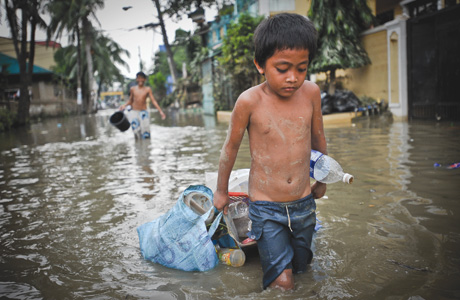 These days, virtually everyone knows that the world we take for granted is becoming more precarious as a result of climate change. The key question is what we do as a result of this knowledge.
These days, virtually everyone knows that the world we take for granted is becoming more precarious as a result of climate change. The key question is what we do as a result of this knowledge.
The official answer is various forms of mitigation and adaptation. In reality, however, there are many sectors of the economy and state in overdeveloped nations such as the U.S. that are primed to benefit financially and politically from climate chaos.
One of the main areas which stands to profit from climate change-induced social precariousness is the security industry. Policy analysts in this sector are already predicting that the security industry and the military will have to be augmented to deal with the social displacement and turmoil generated by climate change. Instead, in other words, of thinking about how to establish solidarity with affected nations and climate refugees, policy wonks in the U.S. and elsewhere are entrenching the lifeboat ethics that characterizes current racist anti-immigrant policies.
 Examples include a recent report by the U.S. National Academy of Sciences called The Security Implication of Social Stress from Climate Change. The same agency also recently released a report discussing the national security implications of climate change for the U.S. Navy.
Examples include a recent report by the U.S. National Academy of Sciences called The Security Implication of Social Stress from Climate Change. The same agency also recently released a report discussing the national security implications of climate change for the U.S. Navy.
Such efforts by the security industry and military to profit from climate change are itemized and denounced in a key recent article by Nick Buxton and Ben Hayes. The Secure and the Damned, which excerpts a forthcoming book, provides an overview of the rationales advanced for securitizing climate change, and challenges the basic logic of such moves. Here is a paragraph from the article that summarizes some of the key issues:
In a world already demeaned by concepts like ‘collateral damage’, participants in these new climate war games need not speak candidly about what they envisage, but the subtext to their discourse is always the same: how can states in the industrialised North – at a time of increasing potential scarcity and, it is assumed, unrest – secure themselves from the ‘threat’ of climate refugees, resource wars and failed states, while maintaining control of key strategic resources and supply chains? In the words of the proposed EU climate change and international security strategy, for example, climate change is ‘best viewed as a threat multiplier’ which carries ‘political and security risks that directly affect European interests’.
Christian Parenti works some of this same territory in fascinating detail in his book Tropics of Chaos: Climate Change and the New Geography of Violence. This is dangerous trend that the movement for climate justice is going to have to fight with all its power. We should remember, as the Cochabamba Declaration underlines, that the military is the source of a significant amount of world-destroying greenhouse gas emissions rather than a just solution to climate change.